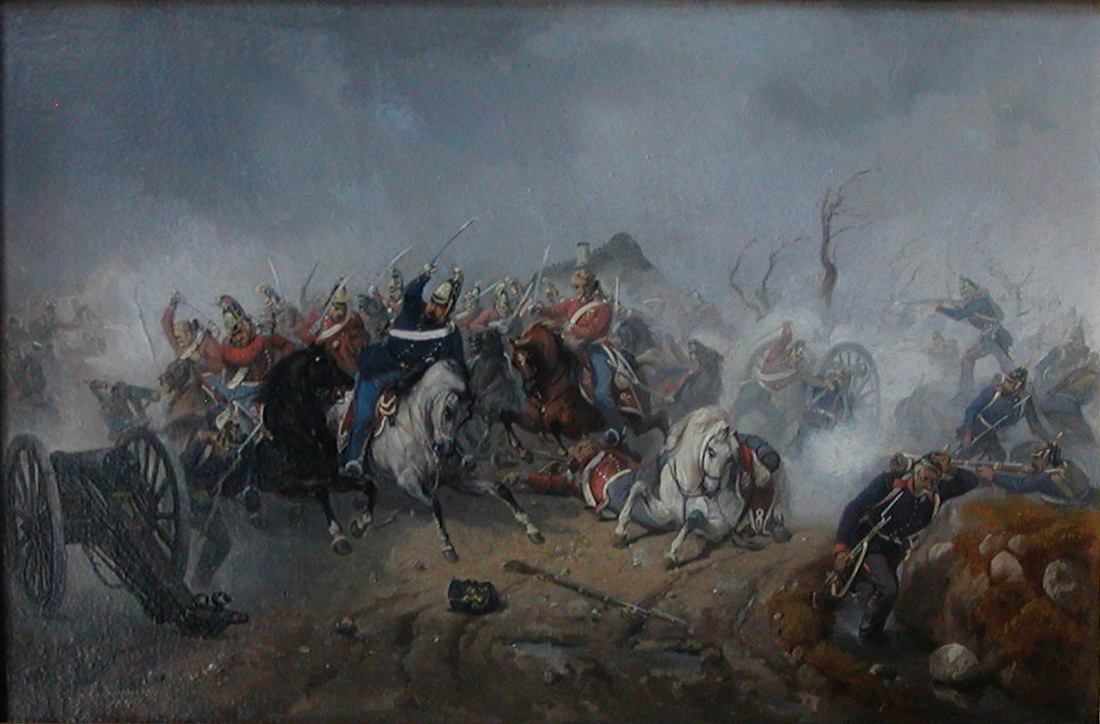Part of the Prussian army at the time was two very young and prevalent military minds who would eventually be a part of the American Civil War. The first was Alexander von Schimmelfennig who had come from a long lineage of the military. Much different than other men who had served in his family, he was small in stature and socially awkward to many. He would never fraternize with other soldiers, unless they were part of his family also serving in the military, and would often seclude himself to read military theories and philosophies in his spare time. At the time of the Schleswig-Holstein War, he had not been diagnosed, but he suffered from chronic dyspepsia causing him some severe medical problems. Never caring about his appearance, he would often wear old uniforms and kept his hair in an unkempt fashion. The other was Leopold von Gilsa who was more prominent in the Prussian army than his colleague, Schimmelfennig. Von Gilsa was already a Major and his family ties came from the Duchy of Brunswick. His father, Baron von Gilsa, was also a military man which can explain the quick rise of the ranks for his son. These two men were part of the twelve thousand strong force of Prussians heading towards the Duchy of Schleswig to fight for the freedom of the people in revolt.
The Schleswig-Holstein War of 1848 has often been forgotten in the annals of history for two major reasons. The first is that it was occurring during the terrible revolutions of 1848 caused by France and sweeping through Europe. There are some historians who even state that the German Revolution had some causes from the Schleswig-Holstein War. The second reason it is often forgotten is because of the fast paced nature of the engagements. Unlike the American Civil War where battles are spread out between weeks, the Schleswig- Holstein War boasts engagements within days of each other. This also has to do with the small neck of Denmark and Schleswig. The nature of the geography forces combat to occur and Wrangel knows this going into the conflict.
On April 23rd, Wrangel placed himself on the downside of an overlook out of sight from the Danish army. His force of twelve thousand Prussians were quietly waiting for the attack from the Danish while the force sent from the German Confederation engages the Danish. The German Reich Troops were sent as a militia force to skirmish with the Danish army and force them to ride into the lines of the Prussians. A battle which seems a lot like the engagement at Cowpens during the American Revolution, the German Reich Troops began to retreat into the lines of the Prussians and following closely were the Danes. The Prussians opened fire on their enemy and the slaughter began. The Danish force, under Colonel Frederick Laessoe only had four thousand Danish with him and had not expected Wrangel and his army. Happening on Easter morning, the Battle of Schleswig stands as a testament to the Prussian army and as a catalyst. Now, with Prussia aiding the German Confederation in a militaristic fashion, the Prussians felt as though they had more claim to the people of Schleswig than the confederation had. This would cause problems politically for Wrangel and the Prussian high command in the months to come. Victorious at the Battle of Schleswig, the Prussian army pushed on believing that now was their chance to invade Denmark. Wrangel and his men forced their armies into the Jutland of Denmark and the war would continue.
At the Battle of Schleswig, many historians believe that Alexander von Schimmelfennig fought with distinction and gained his captaincy there. The reason this is speculation is because the records of the Schleswig-Holstein War of 1848 are not complete and spotty at best. Because the Prussia army would lose this war, there is belief that there was a purposeful loss of records. While both Schimmelfennig and von Gilsa would fight in this war, there is little to no historic record as to where they fought.
Also occurring on April 23rd was the Battle of Mysunde which ended in a victory for the German Confederation. This was a big deal for the confederation due to the lack of Prussian involvement in the battle. This also scared the Prussian army into the belief that the confederation could win victories without them. On April 24th, the Battle of Oeversee brought another Prussian victory forcing the army farther into the Jutland and creating a scare for Frederick VII who had now called the Prussian threat an invasion against his people. No longer considering it a rebellion of the people of Schleswig and Prince Noer, who was out of the picture now, he had to think about reinforcing the army or ending this conflict politically. After the Battle of Oeversee, Frederick would seek the sanction of a political end to this small conflict and the fighting would cease for a month. It would be the longest cease fire in the year of 1848 for this war.
Next week, we will talk about the end of the Schleswig-Holstein War in 1848 and the treaty which would cause Alexander von Schimmelfennig to resign.
Image of The Battle of Schleswig is courtesy of wikipedia.org

 RSS Feed
RSS Feed
